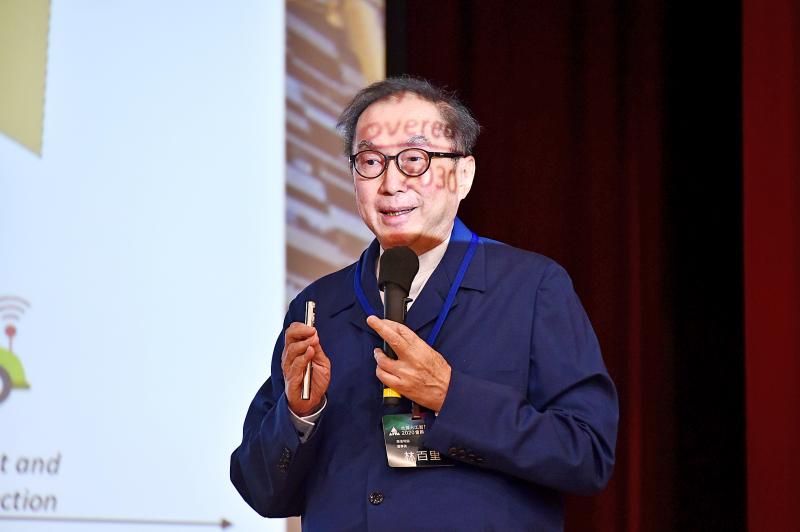Quanta Computer Inc (廣達電腦) is to invest NT$910 million (US$32.15 million) to expand capacity in Thailand through its subsidiary QMB Co, the company said in a regulatory filing yesterday.
The investment is part of Quanta’s NT$2 billion Thai expansion plans, which it announced in a regulatory filing in November last year.
QMB was established in 2019 as a part of Quanta’s efforts to exit China amid a US-China trade dispute.

Photo: Tu Chien-jung, Taipei Times
In an investors’ conference call, Quanta chairman Barry Lam (林百里) described the move to Thailand as a “must.”
According to the Taiwan Stock Exchange filing, Quanta entered into a contract with Cheer You Construction Thailand (啟宇營造).
The money would be used for materials and construction of factory facilities for “expanding production capacity, it said.
Quanta’s board approved the plan the same day, it said.
Quanta is the world’s biggest contract notebook computer maker, although Lam told an investors’ conference in November last year that the company is expanding its business into new technologies, such as robotic arms, artificial intelligence testing equipment and driverless vehicles.
In addition to investing in Thailand, Quanta has continued to expand its Taiwanese production capacity.
Chinese-language online news outlet cnYES.com reported that Quanta has completed a third production building across the road from its headquarters in New Taipei City’s Linkou District (林口) to produce servers and other high value-added products starting from the second quarter of this year.

TECH BOOST: New TSMC wafer fabs in Arizona are to dramatically improve US advanced chip production, a report by market research firm TrendForce said With Taiwan Semiconductor Manufacturing Co (TSMC, 台積電) pouring large funds into Arizona, the US is expected to see an improvement in its status to become the second-largest maker of advanced semiconductors in 2027, Taipei-based market researcher TrendForce Corp (集邦科技) said in a report last week. TrendForce estimates the US would account for a 21 percent share in the global advanced integrated circuit (IC) production market by 2027, sharply up from the current 9 percent, as TSMC is investing US$65 billion to build three wafer fabs in Arizona, the report said. TrendForce defined the advanced chipmaking processes as the 7-nanometer process or more

China’s Huawei Technologies Co (華為) plans to start mass-producing its most advanced artificial intelligence (AI) chip in the first quarter of next year, even as it struggles to make enough chips due to US restrictions, two people familiar with the matter said. The telecoms conglomerate has sent samples of the Ascend 910C — its newest chip, meant to rival those made by US chipmaker Nvidia Corp — to some technology firms and started taking orders, the sources told Reuters. The 910C is being made by top Chinese contract chipmaker Semiconductor Manufacturing International Corp (SMIC, 中芯) on its N+2 process, but a lack

NVIDIA PLATFORM: Hon Hai’s Mexican facility is to begin production early next year and a Taiwan site is to enter production next month, Nvidia wrote on its blog Hon Hai Precision Industry Co (鴻海精密), the world’s biggest electronics manufacturer, yesterday said it is expanding production capacity of artificial intelligence (AI) servers based on Nvidia Corp’s Blackwell chips in Taiwan, the US and Mexico to cope with rising demand. Hon Hai’s new AI-enabled factories are to use Nvidia’s Omnivores platform to create 3D digital twins to plan and simulate automated production lines at a factory in Hsinchu, the company said in a statement. Nvidia’s Omnivores platform is for developing industrial AI simulation applications and helps bring facilities online faster. Hon Hai’s Mexican facility is to begin production early next year and the

Who would not want a social media audience that grows without new content? During the three years she paused production of her short do-it-yourself (DIY) farmer’s lifestyle videos, Chinese vlogger Li Ziqi (李子柒), 34, has seen her YouTube subscribers increase to 20.2 million from about 14 million. While YouTube is banned in China, her fan base there — although not the size of YouTube’s MrBeast, who has 330 million subscribers — is close to 100 million across the country’s social media platforms Douyin (抖音), Sina Weibo (新浪微博) and Xiaohongshu (小紅書). When Li finally released new videos last week — ending what has